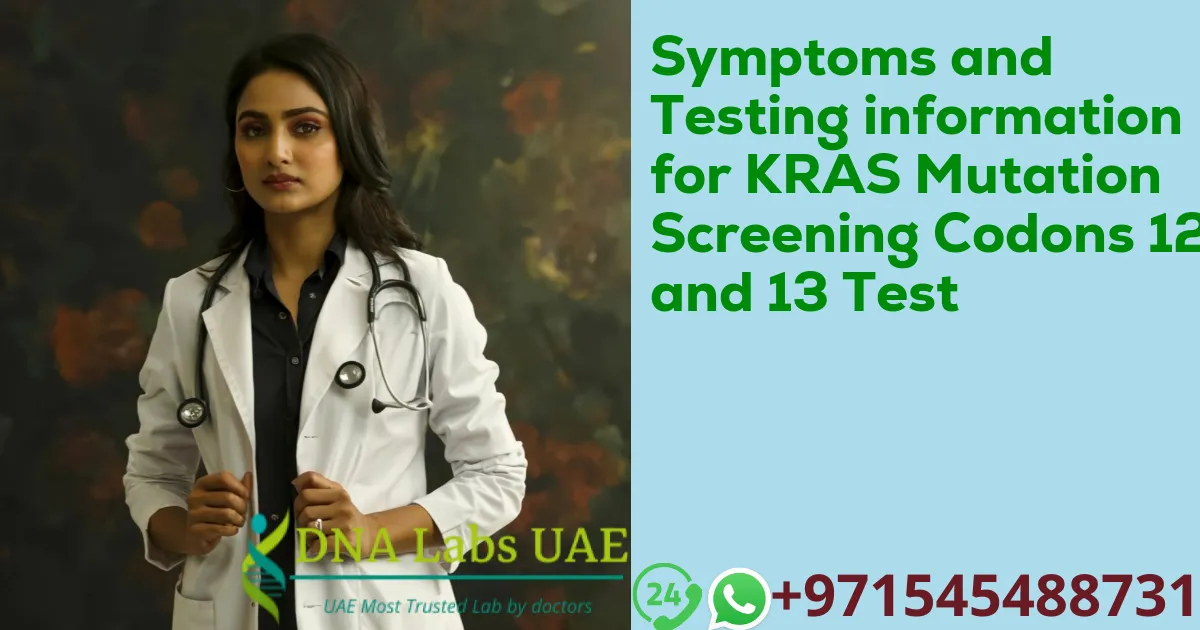Symptoms of KRAS Mutation Screening Codons 12 and 13 Test
The KRAS gene plays a pivotal role in the regulation of cell division. Mutations in this gene, especially in codons 12 and 13, are frequently associated with various cancers, including colorectal, lung, and pancreatic cancers. Identifying mutations in these specific areas can provide critical insights into the nature of a patient’s cancer, influencing treatment decisions and prognostic assessments. The KRAS Mutation Screening Codons 12 and 13 Test, offered at a cost of 2100 AED, is a specialized diagnostic tool aimed at detecting these mutations. Understanding the symptoms that might necessitate this test is crucial for timely and effective medical intervention.
Who Should Consider the KRAS Mutation Screening?
Individuals diagnosed with or suspected of having certain types of cancer are the primary candidates for this test. It is particularly relevant for:
- Patients with colorectal cancer, as a significant percentage of these cancers are known to harbor KRAS mutations.
- Individuals diagnosed with non-small cell lung cancer (NSCLC), where KRAS mutations can influence treatment response.
- Patients with pancreatic cancer, given the high prevalence of KRAS mutations in these cases.
Moreover, the test is also advised for patients undergoing targeted therapy, as the presence of KRAS mutations can render some treatments ineffective, guiding physicians towards alternative therapeutic strategies.
Symptoms Indicating the Need for KRAS Mutation Screening
While the test is specifically designed for individuals with certain cancer diagnoses, recognizing symptoms that might indicate the presence of a KRAS mutation is essential. These symptoms often align with the general signs of the cancers mentioned above but warrant particular attention for potential genetic testing:
- Colorectal Cancer: Symptoms may include changes in bowel habits, blood in the stool, unexplained weight loss, and persistent abdominal discomfort.
- Non-Small Cell Lung Cancer: Persistent cough, coughing up blood, chest pain, and recurrent pneumonia or bronchitis may signal the need for testing.
- Pancreatic Cancer: Symptoms include jaundice, pain in the upper abdomen or back, unexplained weight loss, and new-onset diabetes.
It’s important to note that these symptoms can be indicative of a range of conditions, not just cancer or the presence of a KRAS mutation. Therefore, a thorough evaluation by a healthcare professional is essential to determine the necessity of the KRAS Mutation Screening Codons 12 and 13 Test.
Understanding the Impact of KRAS Mutations
KRAS mutations can have a significant impact on the prognosis and treatment of cancer. They are often associated with resistance to certain targeted therapies, particularly those targeting the EGFR pathway in colorectal and non-small cell lung cancers. Consequently, detecting these mutations can help tailor treatment plans to improve outcomes. The KRAS Mutation Screening Codons 12 and 13 Test provides valuable information for this purpose, guiding the selection of the most effective treatments for patients with specific KRAS mutations.
Conclusion
The KRAS Mutation Screening Codons 12 and 13 Test is a critical diagnostic tool for patients with certain types of cancer. At a cost of 2100 AED, it offers invaluable insights into the genetic makeup of tumors, influencing treatment decisions and potentially improving patient outcomes. Recognizing the symptoms that may warrant this test is the first step toward leveraging its benefits. For more information, visit DNA Labs UAE.



